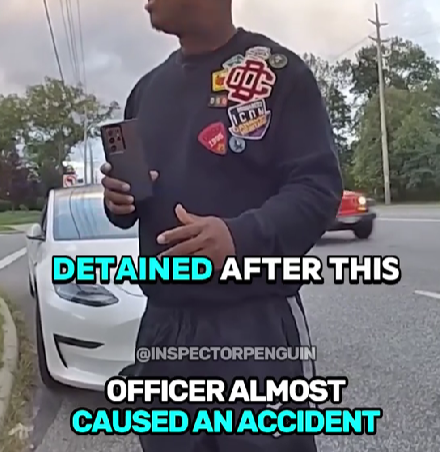A routine traffic stop turned into a viral controversy after a police officer allegedly caused a near collision — only to detain the driver who questioned the incident. The entire exchange, caught on bodycam and bystander footage, has reignited debate over accountability, police conduct, and citizens’ rights during traffic stops.
According to witnesses, the confrontation began when the officer abruptly pulled onto the road without signaling, forcing an oncoming car — a white Tesla — to brake suddenly to avoid a collision. The driver, who was reportedly shaken but unharmed, decided to pull over behind the officer’s vehicle to record what had just happened. That decision would lead to an unexpected and tense encounter.
Footage shows the driver, calm and holding his phone, standing beside his car as he asked the officer why he had nearly caused a crash. “You almost hit me, officer,” he can be heard saying. “I just want to understand what happened.” Instead of acknowledging the concern, the officer appeared defensive, ordering the man to step back and demanding identification.
When the driver questioned why he was being asked for ID after not committing any violation, the situation escalated. The officer accused him of “interfering with police activity” and detained him on the spot — even though, as later confirmed by witnesses, the officer had been the one who initiated the unsafe maneuver.
The bodycam footage reveals the tension rising as the officer handcuffs the man while he continues to calmly explain that he had simply been trying to hold the officer accountable. “I wasn’t yelling. I wasn’t threatening. I just asked why he pulled out like that,” the driver later told reporters.
The video spread rapidly online, drawing widespread criticism. Viewers expressed disbelief that someone could be detained for questioning an officer’s mistake. “So the person almost gets hit and ends up in cuffs? That’s unreal,” one commenter wrote. Others praised the driver for staying calm despite the provocation.
Legal experts have since weighed in, noting that citizens have every right to record and question law enforcement as long as they are not interfering or obstructing official duties. “The officer’s reaction was disproportionate,” one attorney said. “If anything, this incident highlights why bodycam transparency is essential.”
The local police department has acknowledged the incident and announced an internal review to determine whether proper procedures were followed. “We take all allegations of misconduct seriously,” a spokesperson stated. “Our goal is to ensure both public safety and accountability.”
As for the driver, he was released later that day without charges but described the experience as humiliating and frightening. “I didn’t deserve to be treated like that,” he said. “I respect the police, but respect goes both ways.”
The viral clip has since sparked nationwide discussion about power dynamics during traffic stops and the growing importance of civilian recordings. In an age where one video can expose injustice, this case serves as a powerful reminder: sometimes the camera really does tell the full story.
